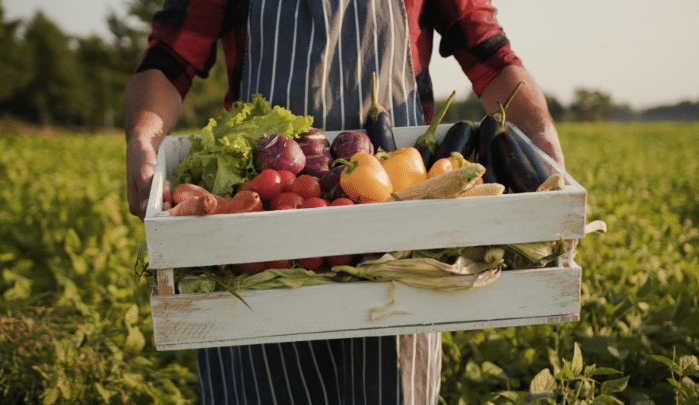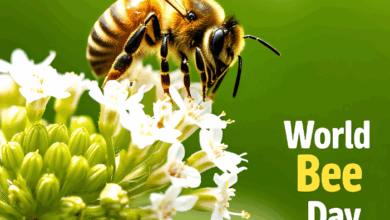Farmer’s Day ~ Friday Humor
Honoring The Hands That Feed Us: Meaningful Ways To Celebrate Farmer's Day

Farmers’ Day is a celebration that honors the vital role of farmers and agriculture in society. It is observed in various countries, often on different dates, to recognize farmers’ hard work, dedication, and contributions to sustaining food supplies and supporting economies.
In some countries, like Ghana, Farmers’ Day is observed on the first Friday of December, and it has been a public holiday since 1985. The Day is marked with national awards for farmers who have excelled in various categories, such as crop production, animal husbandry, and innovation in agriculture.
In India, it is known as Kisan Diwas. It is celebrated on December 23 to honor the birth anniversary of Chaudhary Charan Singh, the fifth Prime Minister of India and a strong advocate for farmers’ rights.
In the United States, National Farmers Day (often observed on October 12) celebrates the hard work of American farmers, particularly in the fall season during harvest time. Although it isn’t a public holiday, it’s an opportunity to acknowledge farmers’ labor-intensive work to provide food and raw materials.
Each country’s observance of Farmers’ Day highlights the specific agricultural contributions of its regions. It promotes appreciation for farmers’ critical role in local communities and the global economy.
History of Farmers Day
The history of Farmers’ Day varies by country but generally stems from a need to acknowledge and appreciate the immense contributions of farmers to society and the economy. Farmers have been the backbone of the U.S. economy since its foundation, and agriculture was central to its development.
National Farmers Day, celebrated on October 12, is believed to have started in the early 19th century to show gratitude to the farming community, particularly during the harvest season.
The Day honors farmers’ hard work and raises awareness of the challenges they face in modern agricultural production. It recognizes its role in food production and sustaining the nation’s economy. Although it isn’t a public holiday, local communities, schools, and organizations in rural areas often hold events and activities to celebrate and support farmers on this Day.
Farmers’ recognition can be tied to harvest festivals or national agricultural fairs in many other countries. These may not be formal holidays but are opportunities to celebrate the efforts of farmers and agricultural workers.
Agriculture has always played a fundamental role in human history. Early civilizations were built around the ability to cultivate land and produce food, leading to the development of cities and trade. Over time, as industrialization advanced, the role of farmers shifted but remained essential.
Celebrating Farmers’ Day gained traction as nations recognized the importance of supporting and appreciating farmers, especially in light of climate change, economic instability, and food security issues.
Farmers’ Day, in various forms, reminds us of farmers’ indispensable contributions to national and global well-being and fosters appreciation, education, and policy discussions surrounding agriculture.
How to Celebrate Farmer’s Day
Celebrating Farmers’ Day is a meaningful way to recognize and honor the vital contributions of farmers to society. Whether on a local, national, or personal level, there are many ways to show support and appreciation for the farming community. Here are several ideas on how to celebrate Farmers’ Day:
1. Support Local Farmers
Visit Farmers’ Markets: Purchase fresh, locally grown produce, dairy, and meat from a nearby market. Supporting local farmers directly helps boost the local economy and encourages sustainable farming practices.
Buy Directly from Farms: Visit farms in your area and buy products directly from the source. Some farms offer “pick-your-own” experiences, where you can harvest fruits, vegetables, or flowers yourself.
Join a Community-Supported Agriculture (CSA) Program: Sign up for a CSA, where local farms regularly deliver fresh seasonal produce to members. This helps support small-scale farmers and provides you with healthy, farm-fresh food.
2. Host or Attend Events
Farm Tours and Open Houses: Some farms may offer tours, allowing people to see firsthand how farming works. Attend an open farm day or encourage local farms to host one. Harvest Festivals and Fairs: Many communities hold agricultural fairs, harvest festivals, or Farmers’ Day celebrations, often including educational exhibits, farm equipment displays, and activities for all ages.
Workshops and Educational Events: Organize or attend workshops on sustainable agriculture, organic farming, or urban gardening. These events raise awareness about agricultural issues and provide valuable knowledge for budding farmers or home gardeners.
3. Volunteer
Farm Volunteering: Volunteer at a local farm, especially community gardens or educational farms, to help plant, harvest, or maintain crops. This hands-on experience allows farmers to give you a deeper understanding of their work.
Food Banks and Shelters: Many food banks or shelters collaborate with local farmers to provide fresh produce to those in need. Volunteering at these organizations helps distribute farm products and supports food security.
4. Learn and Spread Awareness
Educate Yourself on Agricultural Issues: Learn about the challenges farmers face, such as climate change, access to resources, labor issues, and the economics of farming. Share what you know on social media to raise awareness.
Engage with Farmers: Use this Day to listen to farmers’ stories and experiences. Whether through documentaries, interviews, or in-person conversations, learning about their lives and work can foster a deeper appreciation.
Promote Sustainable Practices: Share information on how people can support sustainable and regenerative agriculture, which benefits farmers and the environment.
5. Recognize and Thank Farmers
Send Thank-You Notes: Express your gratitude by writing thank-you letters or messages to local farmers. A simple acknowledgment of their hard work can go a long way.
Highlight Farmers on Social Media: Use social media platforms to highlight local farmers and their work. Post about their contributions and include hashtags like #FarmersDay, #ThankAFarmer, or #SupportLocalFarmers to spread awareness.
Nominate or Celebrate Farmers: In countries like Ghana, where Farmers’ Day includes awards, consider nominating a deserving farmer for recognition or celebrating the achievements of farmers in your community.
6. Organize a Fundraiser or Donation Drive
Fundraising Events: Organize a fundraiser to support farming initiatives, especially for small-scale or organic farmers. Donations could go toward purchasing equipment, seeds, or farmer education programs.
Food Drives: Partner with local farms to host a food drive for those in need. This helps farmers by buying their produce and ensures that fresh food reaches underserved communities.
7. Cook a Farm-to-Table Meal
As a tribute to farmers, prepare a meal using only locally grown ingredients. Invite friends and family to share the meal and discuss the importance of supporting local agriculture and sustainable food systems.
8. Engage Children and Youth
School Programs: Encourage schools to organize activities like farm visits, gardening projects, or lessons about agriculture and its importance in society. Educating the next generation about farming can instill respect for farmers’ work.
Storytelling and Crafts: Involve children in creative activities like storytelling, drawing, or crafts that depict farming life. This can be a fun and educational way to introduce them to the significance of farming.
9. Donate to Farming Causes
Support organizations that improve farmers’ lives, especially those focused on rural development, sustainable agriculture, or fighting hunger. Donating to charities that provide resources or advocate for farmers can impact lives.
10. Attend Farmers’ Day Ceremonies
In countries where official celebrations occur, such as Ghana’s National Farmers’ Day, attend the award ceremonies and public events honoring top-performing farmers. Attending these events shows community support and offers an opportunity to engage with agricultural leaders.
Celebrating Farmers’ Day is a chance to acknowledge the hardworking individuals who provide us with food, textiles, and other essential products. Your participation can positively impact farmers’ lives through direct support, learning, or spreading awareness. Enjoy our farmer-related joke.
A farmer has 895 sheep.
Realizing that this is quite a lot of sheep for one farm, and Jess, the sheepdog, is getting a bit old, he decides he’ll probably need a new dog—no, a whole team of dogs—to round up so many sheep.
So the next Day, the farmer goes to the pet store. He looks around at the various herding dogs- they seem very fit but young and untrained. The shopkeeper asks the farmer if he wants any help.
“Why yes,” says the farmer. I need a team of sheepdogs to help round up my flock. I have a relatively large number of sheep, and I don’t think any of these young pups would be up to rounding up so many.”
The shopkeeper says, “I’ve got just the thing for you.” and leads the farmer into a small back room, where a single sheepdog sits waiting.
“Are you sure?” asks the farmer, “I have very many sheep, and I don’t think one dog will be able to round them up.”.
“I’m sure.” says the shopkeeper, “This is a brilliant dog. He’s been well-trained for many jobs and has skills beyond any other dog I’ve seen.”
“Yes,” says the dog, “I know six languages, eight martial arts, and I have a degree in engineering.”
The farmer, clearly very impressed by this dog- who wouldn’t be impressed by that?- decides to take him home.
That afternoon, the farmer and the dog walk uphill together, and from the top, they can see the entire flock covering the fields.
“Well,” says the farmer, “I’d like you to round up all these sheep.”.
“Okay.” replies the dog, “You have nine hundred sheep.”
Here are some healthy foods to help you sleep better.
Have you sought a sustainable laundry detergent that won’t break the bank? Look no further! Earth Breeze is an eco-friendly laundry detergent that doesn’t compromise quality over sustainability.
Hypoallergenic, scentless, and philanthropic, Earth Breeze aims to give back with every load of laundry. It is ideal for extended usage, and half a sheet of detergent is more than enough.
For difficult stains, you only need to use more than one sheet. Luckily, Earth Breeze’s strong capabilities can remove stains seamlessly, making it easy to do a lot of laundry without using too much detergent.
Efficient, mess-free, and machine-accessible, Earth Breeze is the quintessential laundry detergent for every kind of family. When you subscribe to Earth Breeze, you invest in a cause to reduce waste and restore nature.
For every package sold, they give away ten more to people in need—ditch liquid detergent for sustainable packaging and increased efficiency.






